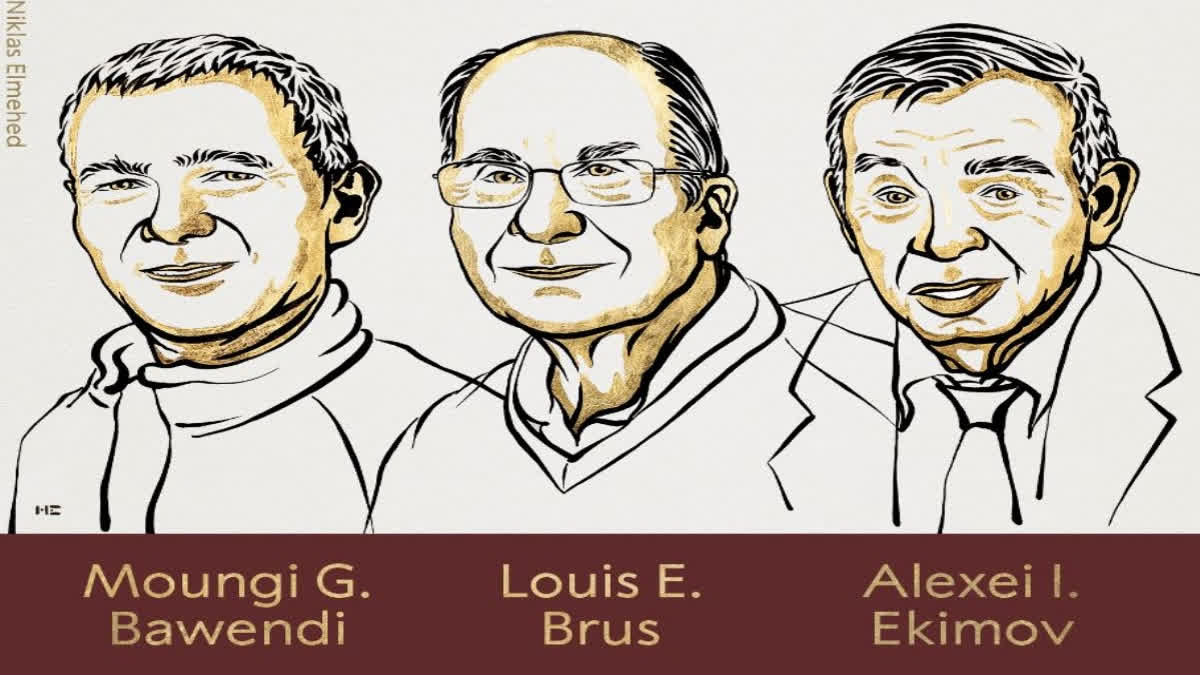Stockholm: The 2023 Nobel Prize in Chemistry has been awarded to Moungi G. Bawendi, Louis E. Brus and Alexei I. Ekimov “for the discovery and synthesis of quantum dots.”
The Royal Swedish Academy of Sciences announced the award on Wednesday in a press conference in Stockholm. In a press statement, the Academy said the 2023 Nobel Prize in Chemistry rewards the discovery and development of quantum dots, nanoparticles so tiny that their size determines their properties.
-
BREAKING NEWS
— The Nobel Prize (@NobelPrize) October 4, 2023 " class="align-text-top noRightClick twitterSection" data="
The Royal Swedish Academy of Sciences has decided to award the 2023 #NobelPrize in Chemistry to Moungi G. Bawendi, Louis E. Brus and Alexei I. Ekimov “for the discovery and synthesis of quantum dots.” pic.twitter.com/qJCXc72Dj8
">BREAKING NEWS
— The Nobel Prize (@NobelPrize) October 4, 2023
The Royal Swedish Academy of Sciences has decided to award the 2023 #NobelPrize in Chemistry to Moungi G. Bawendi, Louis E. Brus and Alexei I. Ekimov “for the discovery and synthesis of quantum dots.” pic.twitter.com/qJCXc72Dj8BREAKING NEWS
— The Nobel Prize (@NobelPrize) October 4, 2023
The Royal Swedish Academy of Sciences has decided to award the 2023 #NobelPrize in Chemistry to Moungi G. Bawendi, Louis E. Brus and Alexei I. Ekimov “for the discovery and synthesis of quantum dots.” pic.twitter.com/qJCXc72Dj8
"These particles have unique properties and now spread their light from television screens and LED lamps. They catalyse chemical reactions and their clear light can illuminate tumour tissue for a surgeon. Researchers have primarily utilised quantum dots to create coloured light. They believe that in the future quantum dots can contribute to flexible electronics, miniscule sensors, slimmer solar cells and perhaps encrypted quantum communication," the statement read.
The Nobel Laureates in Chemistry 2023 have succeeded in producing particles so small that their properties are determined by quantum phenomena. The particles, which are called quantum dots, are now of great importance in nanotechnology.
“Quantum dots have many fascinating and unusual properties. Importantly, they have different colours depending on their size,” says Johan Aqvist, Chair of the Nobel Committee for Chemistry.
-
In the early 1980s, this year’s chemistry laureates Louis Brus and Alexei Ekimov succeeded in creating
— The Nobel Prize (@NobelPrize) October 4, 2023 " class="align-text-top noRightClick twitterSection" data="
– independently of each other – quantum dots, which are nanoparticles so tiny that quantum effects determine their characteristics.#NobelPrize pic.twitter.com/QPd3AhaBeX
">In the early 1980s, this year’s chemistry laureates Louis Brus and Alexei Ekimov succeeded in creating
— The Nobel Prize (@NobelPrize) October 4, 2023
– independently of each other – quantum dots, which are nanoparticles so tiny that quantum effects determine their characteristics.#NobelPrize pic.twitter.com/QPd3AhaBeXIn the early 1980s, this year’s chemistry laureates Louis Brus and Alexei Ekimov succeeded in creating
— The Nobel Prize (@NobelPrize) October 4, 2023
– independently of each other – quantum dots, which are nanoparticles so tiny that quantum effects determine their characteristics.#NobelPrize pic.twitter.com/QPd3AhaBeX
Physicists had long known that in theory size-dependent quantum effects could arise in nanoparticles, but at that time it was almost impossible to sculpt in nanodimensions. Therefore, few people believed that this knowledge would be put to practical use.
However, in the early 1980s, Alexei Ekimov succeeded in creating size-dependent quantum effects in coloured glass. The colour came from nanoparticles of copper chloride and Ekimov demonstrated that the particle size affected the colour of the glass via quantum effects.
A few years later, Louis Brus was the first scientist in the world to prove size-dependent quantum effects in particles floating freely in a fluid.
In 1993, Moungi Bawendi revolutionised the chemical production of quantum dots, resulting in almost perfect particles. This high quality was necessary for them to be utilised in applications.
Quantum dots now illuminate computer monitors and television screens based on QLED technology. They also add nuance to the light of some LED lamps, and biochemists and doctors use them to map biological tissue.
Quantum dots are thus bringing the greatest benefit to humankind. Researchers believe that in the future they could contribute to flexible electronics, tiny sensors, thinner solar cells and encrypted quantum communication – so we have just started exploring the potential of these tiny particles.
About the Laureates-
Moungi G. Bawendi, Born 1961 in Paris, France. PhD 1988 from University of Chicago, IL, USA. Professor at Massachusetts Institute of
Technology (MIT), Cambridge, MA, USA.
Louis E. Brus, born 1943 in Cleveland, OH, USA. PhD 1969 from Columbia University, New York, NY, USA. Professor at Columbia University, New York, NY, USA.
Alexei I. Ekimov, born 1945 in the former USSR. PhD 1974 from Ioffe Physical-Technical Institute, Saint Petersburg, Russia. Formerly Chief Scientist at Nanocrystals Technology Inc., New York, NY, USA.



